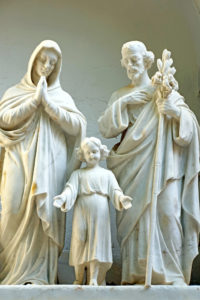Posted by Roberta Grimes • September 05, 2020 • 21 Comments
Jesus, The Teachings of Jesus
Images of broken light which dance before me like a million eyes,
They call me on and on across the universe.
Thoughts meander like a restless wind inside a letter-box.
They tumble blindly as they make their way across the universe.
– John Lennon (1940-1980), from “Across the Universe” (1969)
 It’s very unlikely that there ever was an actual Sermon on the Mount. The Jesus of the Gospels was an itinerant teacher with an ever-increasing crowd in His wake, and there were always Temple guards around who were eager to report to religious leaders whatever heretical statements they heard. Since much of what the Lord had come to teach amounted to heresy, He had to parse out most of His teachings in innocuous bits here and there. For Him to have stood on a hillside and given to hundreds or thousands of people the long and organized speech containing many heresies that is the Sermon on the Mount would have been a lunatic act! And it comes early in the public phase of His life. If He had taught this way, He could not have survived and continued to teach for three more years at a time in history when the only way He could have made any impact at all was by teaching the truth over and over again in many places over years of time. It is likely that those who wrote down the folk memories of the teachings of Jesus that survived into the third generation simply organized them into collections that later made their way into the written Gospels.
It’s very unlikely that there ever was an actual Sermon on the Mount. The Jesus of the Gospels was an itinerant teacher with an ever-increasing crowd in His wake, and there were always Temple guards around who were eager to report to religious leaders whatever heretical statements they heard. Since much of what the Lord had come to teach amounted to heresy, He had to parse out most of His teachings in innocuous bits here and there. For Him to have stood on a hillside and given to hundreds or thousands of people the long and organized speech containing many heresies that is the Sermon on the Mount would have been a lunatic act! And it comes early in the public phase of His life. If He had taught this way, He could not have survived and continued to teach for three more years at a time in history when the only way He could have made any impact at all was by teaching the truth over and over again in many places over years of time. It is likely that those who wrote down the folk memories of the teachings of Jesus that survived into the third generation simply organized them into collections that later made their way into the written Gospels.
The Gospels of Matthew and Luke mostly share the same sources. In Luke, an extract of the collection of teachings that became Matthew’s Sermon on the Mount appears as what is called the Sermon on the Plain, and it is interesting to see how the sayings subtly differ as these two Gospel writers use their common source material. We’ll talk about that next week.
Chapter Seven concludes Matthew’s Sermon on the Mount. In Chapter Six, Jesus tried to banish fear; now in Chapter Seven He works to bring us to a more adult understanding. But before we plunge in, I hope you won’t mind if we pause here briefly. There are two points that I want to make sure you always keep in mind when you read the Gospels.
First, Jesus lived and taught two thousand years ago. He taught at least two centuries before there was any recognizable version of Christianity, and nothing He said even hints that He was trying to form a new religion. On the contrary, He seems to have been trying to move us beyond the need for religions so we could relate to God on our own. We must never forget how primitive the world around Jesus was two thousand years ago! Nor can we overlook the fact that His Gospel teachings were spoken in Aramaic and passed along orally for a couple of generations before being written down and translated into Greek, and from Greek they then were translated into  Latin and all the modern languages. And even beyond all these sources of potential confusion, the Gospels spent more than fifteen hundred years in the custody of Christian leaders to whom some of what Jesus had said must have felt antithetical to their religion. That the Catholic clerics didn’t butcher the Gospels when they could have done that so easily is an astounding blessing. It may be a miracle.
Latin and all the modern languages. And even beyond all these sources of potential confusion, the Gospels spent more than fifteen hundred years in the custody of Christian leaders to whom some of what Jesus had said must have felt antithetical to their religion. That the Catholic clerics didn’t butcher the Gospels when they could have done that so easily is an astounding blessing. It may be a miracle.
And Second, the dead consistently tell us that the Gospel teachings of Jesus are accurate. Even despite the handicaps enumerated above, we are assured by those not now in bodies that the teachings of Jesus as we have them in the four canonical Gospels are indeed substantially what the Lord taught. To be frank, that really is a miracle! But perhaps it’s not such a surprising miracle, since Jesus told us two thousand years ago that He was speaking as God on earth. For example, He said, “ I and the Father are one” (JN 10:30), and “The words that I say to you I do not speak on My own initiative, but the Father abiding in Me does His works” (JN 14:10). Not everything Jesus is quoted as saying in the Gospels actually was said by Him, since the First Council of Nicaea in 325 added some passages on church-building, sheep-and-goats, predestination and election, hellfire and damnation, and end-times nonsense. But those additions are so inconsistent with the Lord’s genuine teachings that we can easily pluck them out. When we have done that, we still have today the genuine words that the Godhead spoke to us through the Lord two thousand years ago!
Matthew’s Chapter Seven is teachings that are mostly quite familiar to us. I am going to give them to you as they appear, and then share a few thoughts at the end of this post. These are teachings that the Lord’s followers considered to be so important that they lovingly passed them along to their children, who shared them with their children and their children’s children. Sixty years or so is three solid generations of oral tradition. So let’s give a grateful thought to the families who made it possible for us to have so many of the Lord’s words intact today!
“Do not judge so that you will not be judged. 2 For in the way you judge, you will be judged; and by your standard of measure, it will be measured to you. 3 Why do you look at the speck that is in your brother’s eye, but do not notice the log that is in your own eye? 4 Or how can you say to your brother, ‘Let me take the speck out of your eye,’ and behold, the log is in your own eye? 5 You hypocrite, first take the log out of your own eye, and then you will see clearly to take the speck out of your brother’s eye.
6 “Do not give what is holy to dogs, and do not throw your pearls before  swine, or they will trample them under their feet, and turn and tear you to pieces.
swine, or they will trample them under their feet, and turn and tear you to pieces.
7 “Ask, and it will be given to you; seek, and you will find; knock, and it will be opened to you. 8 For everyone who asks receives, and he who seeks finds, and to him who knocks it will be opened. 9 Or what man is there among you who, when his son asks for a loaf, will give him a stone? 10 Or if he asks for a fish, he will not give him a snake, will he? 11 If you then, being evil, know how to give good gifts to your children, how much more will your Father who is in heaven give what is good to those who ask Him!
12 “In everything, therefore, treat people the same way you want them to treat you, for this is the Law and the Prophets.
13 “Enter through the narrow gate; for the gate is wide and the way is broad that leads to destruction, and there are many who enter through it. 14 For the gate is small and the way is narrow that leads to life, and there are few who find it.
15 “Beware of the false prophets, who come to you in sheep’s clothing, but inwardly are ravenous wolves. 16 You will know them by their fruits. Grapes are not gathered from thorn bushes nor figs from thistles, are they? 17 So every good tree bears good fruit, but the bad tree bears bad fruit. 18 A good tree cannot produce bad fruit, nor can a bad tree produce good fruit. 19 Every tree that does not bear good fruit is cut down and thrown into the fire. 20 So then, you will know them by their fruits.
21 “Not everyone who says to Me, ‘Lord, Lord,’ will enter the kingdom of heaven, but he who does the will of My Father who is in heaven will enter. 22 Many will say to Me on that day, ‘Lord, Lord, did we not prophesy in Your name, and in Your name cast out demons, and in Your name perform many miracles?’ 23 And then I will declare to them, ‘I never knew you; depart from Me, you who practice lawlessness.’
 24 “Therefore everyone who hears these words of Mine and acts on them, may be compared to a wise man who built his house on the rock. 25 And the rain fell, and the floods came, and the winds blew and slammed against that house; and yet it did not fall, for it had been founded on the rock. 26 Everyone who hears these words of Mine and does not act on them, will be like a foolish man who built his house on the sand. 27 The rain fell, and the floods came, and the winds blew and slammed against that house; and it fell—and great was its fall.”
24 “Therefore everyone who hears these words of Mine and acts on them, may be compared to a wise man who built his house on the rock. 25 And the rain fell, and the floods came, and the winds blew and slammed against that house; and yet it did not fall, for it had been founded on the rock. 26 Everyone who hears these words of Mine and does not act on them, will be like a foolish man who built his house on the sand. 27 The rain fell, and the floods came, and the winds blew and slammed against that house; and it fell—and great was its fall.”
28 When Jesus had finished these words, the crowds were amazed at His teaching; 29 for He was teaching them as one having authority, and not as their scribes (MT 7:1-29).
There are three confusing passages here that we have never before considered:
 Jesus is a Man on a Mission! What Christians might see as impatience or anger is just His ardent zeal for the teachings that He came to share. And the author of the Gospel of Matthew seems to be delighted with the Lord’s mission, which is one reason why for many people this is their favorite Gospel. Next week we will consider how the author of Luke uses the same sources to create from the teachings of Jesus a quieter and more sobering Sermon on the Plain.
Jesus is a Man on a Mission! What Christians might see as impatience or anger is just His ardent zeal for the teachings that He came to share. And the author of the Gospel of Matthew seems to be delighted with the Lord’s mission, which is one reason why for many people this is their favorite Gospel. Next week we will consider how the author of Luke uses the same sources to create from the teachings of Jesus a quieter and more sobering Sermon on the Plain.
Sounds of laughter, shades of life are ringing through my open ears,
Inciting and inviting me.
Limitless, undying love which shines around me like a million suns,
It calls me on and on across the universe.
– John Lennon (1940-1980), from “Across the Universe” (1969)
Dear Roberta, how do we know what are genine teachings of Jesus and what should be plucked out?
Dear Ray, this is a great question! Thomas Jefferson said that the actual words of Jesus stick out in the Bible like diamonds in a coal mine, and actually telling the difference turns out to be pretty easy.
Jesus tells us that He is replacing all the fear-based Old Testament rules with God’s Law of Love, which requires us to learn to love perfectly and forgive completely and to entirely internalize God’s Law of Love as the base of our morality. That is the sum total of His entire Gospel teachings. So anything that fits that is probably His words, and anything that is fear-based, judgmental, or in any way unloving does not. It is also essential that we be on the lookout for anachronisms – things that were not in existence until long after the Lord’s death – like church-building, for example. Or things that He personally spoke against, like legalisms and the power of the clergy. Or things that became fashionable centuries after His death, like End Times, sheep-and-goats, and an obsession with hellfire.
For one example, my wonderful daughter told us in the comments a couple of weeks back that Jesus wouldn’t have insisted on a fear-based law against divorce. Of course, she was exactly right! We can pluck that bit of coal right out.
And here, as a further example, is the most egregious piece of later-added coal to be found in all four Gospels: “I also say to you that you are Peter, and upon this rock I will build My church; and the gates of Hades will not overpower it. I will give you the keys of the kingdom of heaven; and whatever you bind on earth shall have been bound in heaven, and whatever you loose on earth shall have been loosed in heaven” (MT 16:18-19). All of that is utter crap. Here are some reasons why:
1) The name Peter is a pun in Greek (petros), but Jesus spoke Aramaic.
2) Jesus never spoke of building a church, or of starting any kind of new religion.
3) Jesus called the lowest level the Outer Darkness, and it did not have gates.
4) The kingdom of Heaven does not have “keys,” and it is within us; and furthermore, Jesus would never have said that some earthly guy would have the keys to it, or any power over it!
5) Jesus was very clear about God’s power being supreme. He never would have said that any mere mortal could “bind” or “loose” anything in heaven.
6) Most of all, this whole collection of church-building and clergy-empowering nonsense is EXACTLY what those who were building the religion and participating at the First Council of Nicaea in 325 would have most wished that Jesus had said!
As you can see, the better you understand what Jesus actually said, and what He was trying to do, the easier it is for you to spot the later-added nonsense!
Hi Ray, hi Roberta and everybody. I am not a scholar but my brother is. My brother tells me that there is plenty of style analysis that applies to Jesus’ way of phrasing things and the phrasing of interpolators, and this study confirms what our gut can tell us about what was added generations later. But here is another clue: we do not have just His words, but also His actions. The gospels aren’t exactly biography, but they do relate a fairly consistent story (I was in high school before I realized the gospels have a narrative flow). In His life, Jesus was NOT stand-offish; not legalistic; He ate with poor people, non-Jewish people, even lepers and tax collectors (who were often Jewish but working for the Romans and so hated)—in their houses. He healed people, mourned with them and helped them plant and reap crops. His deeds were genuine and humble. He “walked the talk,” so if we wonder what He said, we can read what He also did.
Dear Mike, thank you for pointing this out! Many people who need what Jesus taught don’t have the time or patience to really come to know Him, but those who do take the time to try soon notice that the Man that He emphatically is never would have said some of the most blatant later additions that are toward the back of the Book of Matthew, especially.
Dear Roberta, another set of disparate thoughts!
1. On the ‘end time nonsense’, what do you make of the book of ‘revelation of Jesus Christ’? I for one don’t believe in the ‘pre tribulation rapture’ but can accept times of tribulation 9I think there ae multiple, possibly the decade commencing from 2021; with repeated pandemics, earthquaques, raging seas, 80% unemployment etc.
2. On the topic of God being completely self sufficient; not needing our praise, gifts and (my interpretation) our appraisal folder (our soul) grates with me. I think he does need our collective experiences (motivated by selfishness, wickedness or otherwise). I think my purpose (assisted by Jesus) is to preserve my soul from Satan and deliver it to my Father on my death. What do you think?
God bless, Shola
Dear Shola, to answer your questions:
1) Jesus did speak of the Tribulation, but it is clear from the context that He was talking about the turmoil that would precede not any kind of End Times, but rather the very positive development of the advent of God’s kingdom on earth. The Biblical book of Revelation is just an example of the revenge literature that was current during the persecutions that preceded Constantine and the First Council of Nicaea, and it has nothing to do with anything that might be coming now. Those who really know consistently tell us that. So, no need to think about any of it! Just work to raise your personal spiritual vibration, and when enough of us are doing that all this tribulation will end and the kingdom of God will at last dawn on earth.
2) God doesn’t need anything, but on the other hand we are inextricably part of the Godhead and that genuine Godhead is benefiting from our work to raise our spiritual vibrations in ways that the small part of out eternal minds to which we now have access really cannot understand. So, God doesn’t need our tribute, or indeed anything from us that we can imagine. And BTW, there is no Satan, nor indeed any powerful entity in opposition to God. The more evil an entity is, the weaker it is, so if there were a collective evil entity it would be a blob of powerless nothing.
I hope this helps!
Good morning Roberta,
I’ve read this week’s blog post and I was just wondering if it’s possible that Jesus may have meant in MT 7:6…..
Could it be that Jesus was warning them to be careful in passing on his teachings? Could the “dogs” and “swine” be referring to temple guards and those that might betray them by reporting them to authorities as a heretic? And therefore it was important for them to word the teachings in a way that would be difficult for some to understand as he was doing himself?
What is “holy” (dedicated to Gods purpose) and “pearls” (precious gems needing no cutting or polishing by man to
become perfectly beautiful)
And in MT 7:13……
Is it possible that the “narrow gate” is only found inside ourselves? And that if we are looking or following ways of the world (man made) that we will be passing through “the way that is broad”?
Roberta, I know how busy you are so if you think I have a treasonable understanding it’s not necessary for you to respond to me as you have in the past. However, if I have it all wrong maybe you could let me know.
I appreciate everything you do for all of us. You have no idea how important you are to my spiritual growth. (Perhaps one day I’ll send you an email explaining)
Have a wonderful day and God Bless!
Dear Sandy, you are perfectly right! My instinct is always to put Jesus in an eternal frame and make His words relevant to us today, but He might indeed have been speaking mostly to His contemporary followers. Or perhaps He was doing both! And your interpretations are perfectly as reasonable as are my own – thank you for sharing them here. I love this! You have no idea how widely you are making me smile!!
Dear Ray,
As to the authenticity or non-authenticity of Jesus’s sayings, what works for me is the testimony of the dead who heard them first-hand. I’m not in communication with the dead so I rely on what is admittedly second-hand reports, so I try to listen for a “ring of authenticity” in them.
Yours,
Cookie
Dear Cookie, I think you have internalized the Lord’s teachings enough that this method also works for you, just as it worked for my daughter two weeks ago. It generally works for me as well – something in the Gospels doesn’t pass the “smell test” – but as you can see, I didn’t spot a problem that she did spot, so it’s always good also to double-check by looking to the reasons why something doesn’t “smell” right.
How I wish you had been my Sunday School Teacher! Thank you for you blog posts. I share them across social media. Well Done! I remember on Sundays the kids went to the basement for classes whilst church was engaged upstairs. Our class was a So Baptists convert who was teaching the Bible from his human experience. All I knew it is didn’t feel like Love to me, so I left Sunday School and went upstairs to Church where I got lost in the Love of the chanting in Serbian (Orthodox Church).
Dear Kathy, I also was going to grown-up church rather than Sunday School before the age of ten. I think it’s awful that the church you were attending was teaching fear-based things to children! In my case, the reason was more benign: after my experiences of light at eight, just spending the time singing and coloring felt stupid. Yes, one day we will need to begin to share online lessons for all our precious children that will help them to understand the joyous truths that Jesus taught!
I have said this before and will say it again, Roberta has a book called Liberating Jesus ( that was channeled through Jesus and her guide Thomas Jefferson) which is a must read. It has helped me immensely understand more deeply what Roberta is explaining in these blogs.
Oh my wonderful friend David, thank you so much for saying this!
I don’t get the royalties from my books now, after I came to understand that all of them were in fact channeled. Perhaps I should just say that. But I did have some part in giving them birth!
I’m having some problems understanding M21 where he says “I never knew you – depart from me, you who practice lawlessness.” It sounds like he’s referring to people who innocently did things in his name (presumably because that’s what they thought he wanted). Anyway, it sounds like a pretty harsh statement. especially for someone who didn’t seem to look down his nose at lepers, prostitutes, tax collectors etc. Maybe someone added it in there years after he was here but. if so, why?
Dear Lola, it is indeed possible that this statement was added later, but I agree that it seems like a nonsensical addition. I think rather that it could have been something Jesus said to His followers who were proudly calling themselves His followers, casting out demons and so on, but still not really espousing God’s Law of Love. Instead, they were being old-rules-based and judgmental of others – someone who was a homosexual, perhaps, or stole to feed his family. Rather than letting love be their only internal moral guide, they were judging others. In that sort of situation, He would have emphatically reminded them that the Law of Love really IS the only law! And if they don’t put it first, they will not grow spiritually. After two translations, this might well be how a warning like this from Him could have come out.
Yes, it does seem meant for them, as strangers in the crowd wouldn’t be casting out demons in his name, nor would they prophesy or perform miracles in his name, but the disciples would. Duh, what a dummy. I never even thought of that viewpoint
“Christ is the still point of the turning world.” – T.S. Eliot
Dearest Roberta, these last few weeks of your blog have been amazing. Just sitting with the words of Jesus brings me straight to closeness and stillness. Clearing the mind and just dwelling with Our Lord in silence for a time, is better than any meditation technique.
🙏🏼❣️🌅
Dear Efrem, I feel as you do! And I am sorry for those who are Christians and want to know Jesus, but they have all those fear-based dogmas in the way. Simply sitting and reading His words feels like such an intimate act, like sharing tea with the Lord and asking Him questions, listening to him, perhaps sharing a little joke and making Him smile. The more you read His words, the more you realize how simple His truths really are, yet how much they demand of us. Loving perfectly and forgiving completely, no matter what, may be the hardest thing anyone ever has asked us to master!
Hi Roberta, I often used to think that the first thing I would want to do on the other side would be to go back in time and sit on the grass listening to what Jesus actually said in his sermon on the mount, but recently I was also, like you, thinking that this story is probably just a handy literary device that allowed the author to weave in all the sayings attributed to Jesus, probably already translated into Greek, nicely into his narrative. Modern scholars call this presumed collection of sayings Q. That Jesus would have done such a huge “data dump” all at once, just as you say, seems pretty unlikely and like signing his own death warrant. Kind of disappointing to think about, but what you say makes perfect sense. 🤔
Along these lines 7/6 seems like another way of explaining why he spoke in parables, not only to outfox his opponents, but also that he taught on more than one level at the same time, so that each person could get something out of them at his or her own level. The really deep stuff was probably just spoken to the inner circle.
7/21-23 on similar lines seems like talking about self-righteous people who don’t grasp the teachings, talking the talk, but not really walking the walk, because they still aren’t at that level of understanding.
Dear Scott, I do think that to some extent Jesus shared more advanced teachings with His closest disciples, but it is also clear from the Gospels themselves that He encountered people in the course of His travels that He thought were already advanced. He likely would have shared His more elevated knowledge with them as well, because if there is anything that He emphatically was not, it was elitist!
Great point about Q! I’ll be talking about it next week, since it is a source for both Matthew and Luke. And you might be happy knowing that there are a lot of accounts from dead folks of the fact that Jesus often teaches in the third level, and you can indeed sit under a tree at His feet and listen to Him!